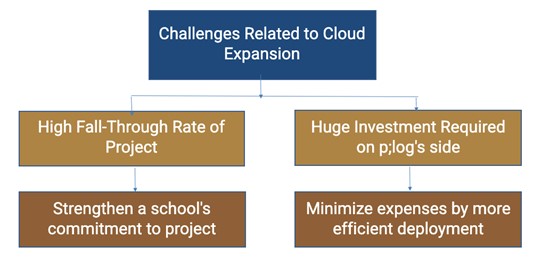By Professor Gary Pan, Associate Professor Yuanto Kusnadi and Benjamin Lee
Leveraging on a University-Industry Partnership Programme – How a Yearbook Publisher Can Pivot its Operations in a New Normal

Transformation in the printing industry
The printing industry is a “sunset” industry that is currently undergoing massive changes, with digital transformation and sustainability being two key issues that the companies in these 2 industries have to face. In addition, the Covid-19 pandemic has hastened the pace of the changes that are taking place and companies have to make serious decisions that will affect their future survival in this industry. This article highlights how one printing solutions provider in Singapore can pivot its operations to be more sustainable in the new post-pandemic normal.
Digitalisation is an important driver for changes for companies in the printing industry. There is a decreasing demand for paper products as many things such as calendars, notes, and photograph storage are all being shifted online. However, some items such as physical yearbooks may still hold much sentimental value, and will not be phased out so quickly.
Sustainability is another important driver as tree huggers and environmentalists may start to also advocate for companies and organizations to go paperless and for deforestation to stop. This may lead to a decrease in the supply of physical paper, causing prices of inputs to go up. Increasing globalisation means foreign MNCs in the printing industry can bring about cost advantages as they can do their business offshore and this gives them an edge over local printing companies.
Challenges faced by p;log
p;log Pte Ltd is a SME in Singapore that specialises in Photobook and Yearbook related services. It is a subsidiary of KHL Group (Singapore’s largest printing group) and started out as a service provider through its various platforms such as https://plog.com.sg (photo products), https://plogyearbook.com (yearbook management), prior to launching https://plogcloud.com (marketing collateral management storefront).
With a strong positioning within the International schools, the company has launched a suite of cloud solutions aimed at making printing convenient and intuitive for all – hence transforming the company to become a solutions provider for printing, content distribution and cloud-based services under its 'web to print solutions' arm of business. This collaborative effort with one of the International schools and the Singapore International Chamber of Commerce has won them the “Most Transformational Collaboration Award”. The cloud-based service is highly integrated with any customers’ backend operations.
The main challenges p;log currently faces are (i) its branding as a yearbook provider, (ii) the long sales cycle needed due to the high level of trust that needs to be established, as well as (iii) its recent loss of customers (from 20 to 15 international schools).
A more in-depth analysis of their issues revealed that it is currently only providing solutions and services to some divisions of the school. Moreover, it is unable to provide a complete print services within the school as many of them have yet to adopt its integrated e-store solution. One major challenge is the clients’ perception of p;log being merely a solutions provider for yearbook. p;log’s marketing strategy is still very traditional and there is a lack of other channel to reach out to new schools. At the same time, p;log wishes to build stronger collaborations with schools on other aspects such as school events (e.g. orientation and graduation ceremonies, fund-raising activities, etc).
Student-Industry Partner Collaboration
With the help of UOB-SMU Asian Enterprise Institute, p;log collaborated with students enrolled in the Accounting for Entrepreneurs course offered by the School of Accountancy in the Singapore Management University, under the SMU-X pedagogy1. In this respect, the students undertook a consultancy project with p;log over the course of one semester, with the objective of providing recommendations for p;log to improve its market share for yearbook in the international school market, as well as to further market its digital offerings to more international schools.
To tackle the challenges faced by p;log, the students have derived two viable recommendations: (i) product bundling and (ii) expansion of cloud services.
In order to obtain a clearer understanding of client preferences and pain points, the students conducted an online interview with a key client, and sent out surveys to students and parents of the international schools (who are p;log’s main customers). Based on the key insights gained, they identified that there is a customer preference towards cheaper printing solution providers, and also for one-time-use products such as posters, pamphlets, etc.; which customers believe do not need to be of high quality. Customers in the market for one-time-use products are relatively price-sensitive, and will primarily look out for low pricesas they are willing to compromise quality for these types of products.
However, this clashes with p;log's value proposition of providing high quality products at premium prices. The company wants to maintain its value proposition of high quality for the price charged, and therefore, undercutting prices for higher demand would not be a valuable compromise. This makes it difficult for p;log to compete in the one-time-use products market.
To tackle this issue, the students proposed a primary shift in focus to their value proposition of offering high quality items. The research has shown that there is well-established customer interest in high quality yearbooks offered by p;log. This brand image can be an anchor to engage customer interest in products which share similar values and traits to that of yearbooks; for example: items high in sentimentality, long lifespans, of high quality and durability. By offering an expanded product range which focuses on quality, p;log can open up more revenue streams. At the same time p;log can maintain prices without resorting to discounts.
p;log could also consider cross-selling in the form of product bundling as a marketing strategy. The bundles could follow specific themes, with different products of similar style, creating customer awareness of p;log's products besides yearbooks. Package deals also nudge customers to place an order for more than just yearbooks because there is an added convenience of having complementary products designed in the same style.
The three themes that the students have selected for product-bundling are: Graduation, Back to School & Sports Day. The items in the bundles have been selected based on gender-neutrality, middle to high income profile of the students and relevance to theme. In addition, the items will be of high quality and durability, in order to be consistent with p;log’s value proposition. By offering such bundles at affordable prices, the students believe that not only would the number of new customers increase, but older customers would also be aware of the various products p;log offers, apart from yearbooks. This encourages them to order from p;log directly instead of outsourcing for another company to print their required products. Figure 1 below provides the students’ recommended theme-based bundling:

Figure 1 – Theme-based Bundling
Figure 1 – Theme-based Bundling
From the students’ interview with p;log, 3 main problems about expanding the cloud service were cited:
- p;log’s high client turnover rate - this resulted in a lack of loyal customers who are willing to commit to a long-term project with p;log;
- high school staff turnover rate, especially for the representatives who are in charge of the cloud service - this is troublesome for p;log as the service requires training and relaying of information from preceding staff to new batcheswho might not be familiar with the cloud usage;
- time consuming and difficult administrative process within the school, with several chains of approval required, which resulted in a long-drawn and complex process for p;log before orders are fulfilled.
Due to these 3 issues, p;log deems it was risky to expand the cloud service to the other schools and currently only has one main international school client (School A) who is using this service.
With regard to the issue on expanding the cloud-based service, two main recommendations were offered. To address the high fall-through rate of the project, p;log was advised to strengthen its client engagement by focusing on promoting this service to longer-term clients who are already loyal customers, especially those who have engaged p;log for more than 3 years. p;log can show them successes from School A, so that new clients know what to expect and may be more invested in the project. p;log could also create a cloud trial video to show a list of products that can be ordered when advertising to the other schools,. This allows clients to see the immediate cost and time savings that such a service could possibly bring, making them more likely to follow through. Clients are also required to make a down payment to solidify their commitment.
To minimize the investment of time and effort into a cloud project, p;log could deploy its resources more efficiently and automate certain tasks. For example, a personnel from p;log can be assigned to take charge of the approval process so that the job could be done more efficiently. He or she could be deployed to multiple schools to maximise his/her productivity as well. Parts of the approval process could also be automated, so that lesser manpower is needed to do the same tasks across different schools. Figure 2 below summarizes the recommendations with regards to challenges related to cloud expansion.

Figure 2 - Challenges of Cloud Expansion
Figure 2 - Challenges of Cloud Expansion
These recommendations offered by students act as a starting point for p;log, much like the spark that ignites the flame, for p;log to consider expanding both their current product range and one of their most promising services, their cloud-based service, to more schools. This would enable p;log to achieve its objective of increasing its market share and making their services more sustainable, which represents an effort towards digitalizing some of its manual processes.
In SMU, we believe that such collaborations between the industry partners and students can benefit both parties. Firstly, students can be exposed to learning about an industry and apply their knowledge and skill-sets to solving real business issues faced by SMEs in the industry. Secondly, the industry partner can also leverage on these young talents to gain new perspectives and insights on its problems. Overall, such partnership should be expanded not to just include existing undergraduate or postgraduate students but also to adult learners. This is extremely crucial as Singapore is increasingly looking to scale up adult learning framework in an effort to upskill these adult learners.
1 It is a course under the ‘Capabilities’ pillar of the SMU Core Curriculum.
About the authors
Gary Pan is Professor of Accounting (Education) and Associate Dean for Undergraduate Admissions and Student Development at School of Accountancy, Singapore Management University; Professor Pan is also Academic Director of SMU-X at the Provost’s Office. Benjamin Lee is Lecturer of Accounting and Director of Student Matters and Yuanto Kusnadi is Associate Professor of Accounting (Education) at the same school.